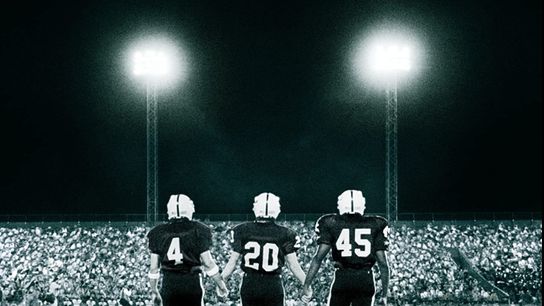The second in our series reviewing classic football and football-adjacent movies.
The film: Friday Night Lights
Release date: Oct. 8, 2004
Tag line: "Hope Comes Alive"
Box office: $62 million against a $30 million budget ($85 million vs. $41 million in 2020 dollars)
Trailer:
https://www.youtube.com/watch?v=O-mI9GajrBc
The plot: What you see is what you get here: the story of a 1988 West Texas high school football team, told through the eyes of the 17-year-olds living inside the fishbowl and the entire town that lives and dies on whether their fish swim better than those in the bowl one town over. In fact, the first twenty-seven minutes is basically one long montage following this formula:
-- A quick look at quarterback Mike Winchell's home life
-- Vignette showing how much Odessa loves football
-- A look at running back Boobie Miles's home life
-- Man, Odessa sure does love football
-- A glance at Don Billingsley's home life
-- THESE HICKS SURE DO LOVE HIGH SCHOOL FOOTBALL!!!
Just like the book, the actual wins and losses of the 1988 Permian Panthers are secondary, mainly fodder of what those wins and losses do to the characters, particularly the two running backs.
The 1988 equivalent of a 5-star running back, Boobie is Permian's star and everyone knows it -- most of all Boobie. He's got a Mercedes-Benz catalogue in his locker, a custom towel around his waist and college recruiters on his tail everywhere he turns.
And then it all ends in a snap. Boobie suffers a (in that era, career-ending) torn ACL in Permian's opener, and though he and LV aren't willing to admit that just yet. They and Gaines tell the team it's just a sprain, just a one, maybe two week injury. A trip to see the doctor in Midland ends in LV having to restrain Boobie from attack the poor guy after he tells Boobie the truth of his injury -- a truth Boobie is only willing to accept when his ACL snaps for good in the Midland Lee game, a resurrection that turned into a funeral.
The scene where Boobie collects his things, says his goodbyes to his (former) teammates, then collapses in tears in LV's cars -- "I can't do nothing else but football!" he weeps -- is an utterly heartbreaking illustration of the first lie the film exposes: that football alone can propel you through life.
https://www.youtube.com/watch?v=f_Pc2_cTQnk
And then there is story of Don Billingsley and his father, Charlie. Don is Permian's fullback/backup running back, and Charlie is his state champion Permian alum, constantly disappointed, and alcoholic father. Their relationship is one of physical and emotional abuse, which manifests itself every time Don fumbles the football. (Which, in fairness, is often.)
Charlie, played by a chillingly good Tim McGraw, humiliates Don in front of his coaches and teammates at practice, and he humiliates him in private as well, in front of a girl. The dynamic comes to a head after the (spoiler) Midland Lee loss, when, on the drive home, a drunk Charlie once again bullies Don, kicks out the windows to his car, and then (gasp) chunks his state championship ring out the window.
The following morning, while papering over the events of just hours before -- "I don't want this to sound like an apology..." -- Charlie attempts to infect his son with the second lie of high school football, one that he clearly believes himself: that football is all you can be.
"This is the only thing you're ever gonna have," Charlie says. "It's forever, it carries you forever. It's a ugly fact of life. Hell, it's the only fact of life. You got one year, one stinkin' year to make yourself some memories, son. That's all. It's gone after that. And I'll be damned if you're not gonna miss it."
And then there is Gaines.
Screenplay writer David Aaron Cohen wrote Gaines as something of a pushover, but he's also the film's conscience. At times he seems to be the only person in all of Odessa that seems to remember this is all a game, played by teenagers.
At the film's climax, Gaines cuts to the core of the film's message: that high school football can be great, if approached properly. It won't carry you through life and it won't define your life, but it can propel you to accomplish what you were truly meant to do in life.
"Well, it's real simple: You got two more quarters and that's it," he says at halftime of the state championship game. "Now, most of you have been playing this game for 10 years. You got two more quarters, and after that most of you will never play this game again for as long as you live. You all have known me for a while, and for a long time you've been hearing me talk about being perfect. Well, I want you to understand something. To me, being perfect is not about that scoreboard out there. It's not about winning. It's about you, and your relationship to yourself and your family and your friends. Being perfect is about being able to look your friends in the eye and know that you didn't let them down, because you told them the truth. And that truth is that you did everything that you could, there wasn't one more thing that you could have done. Can you live in that moment, as best as you can, with clear eyes and love in your heart? With joy in your heart? If you can do that, gentlemen, then you're perfect. I want you to take a moment, I want you to look each other in the eyes, I want you to put each other in your hearts forever, because forever is about to happen here in just a few minutes."
https://www.youtube.com/watch?v=o-iPiN_YHjY
Oh, and sorry to spoil a 32-year-old season, a 30-year-old book and a 16-year-old movie, but Permian loses in the state game.
Does Billy Bob Thornton play a convincing high school football coach? There are times when he seems to overdo it, but he pulls it off with the speech above and this one look, a look that says, "I may be the only adult in this town that realizes this is little more than a game played by children, but all of our lives would sure be a helluva lot easier if y'all can find a way to win this game."
Was Gary Gaines a good coach? The real Boobie Miles was injured in a scrimmage, so I can say this without fear of damaging the innocent: Gaines deserves every bit of ripping he gets for Boobie's injury and then some. Movie Gaines put Movie Boobie back in the game, a season opener (!!!) with a 42-7 lead. Gaines put Boobie in because third-stringer Chris Comer couldn't locate his helmet, but there was no excuse under the sun in which that would have been acceptable. He should have been fired on the spot.
Other things Gary Gaines does over the course of the film:
-- Plays Boobie against Midland Lee without having practiced in nearly two months, and while knowing he has a severe knee injury.
-- Stands by while Charlie Billingsley attacks Don in front of the whole town.
-- After Boobie goes down -- which, again, is his own fault -- Gaines seems to take his frustration out on poor Mike Winchell. Winchell's play appears to go in a tailspin.
-- I don't want to be the know-it-all who asks why the colonists in The Patriot didn't just use tanks, I truly don't. We're all a product of our time, and a player of Boobie's talent played running back in 1988, because that's how football was played back then. (Obviously.) But it's hard not to watch this clip and wonder how much damage Boobie could have done as a power spread quarterback.
https://www.youtube.com/watch?v=CCy2Kyv52Tw
Is there any typical Hollywood sports instability? This movie is personal to me, as it is to all Texans, all former high school football players, and especially all Texans who played high school football. My connection to this film extends even beyond that, though: Myself and my high school teammates happened to be at a Permian-Midland Lee game on the very night this film was released. We were in Midland to play at the same stadium the following Saturday afternoon, and we got to see life imitate art as Lee beat Permian, 42-34. (My team got our heads kicked in the next day, 63-21.)
So everything you're about to read here is 15 years in the making.
Let's start with the small stuff:
-- The practice in the clip above, with coaches from Power 5 schools across the nation, takes place in August. August is a dead period.
-- In Texas, as in just about any state across the country, the name of a high school carrying a name other than the city it's located in is simply presented as "City School Name" with no dash. For instance, Belichick High School in Foxboro would be known as Foxboro Belichick. Saban High School in Tuscaloosa is known as Tuscaloosa Saban. If a high school happens to represent two separate communities, it would have a dash in between the two towns' names. Easy stuff, right?
Not for Friday Night Lights.
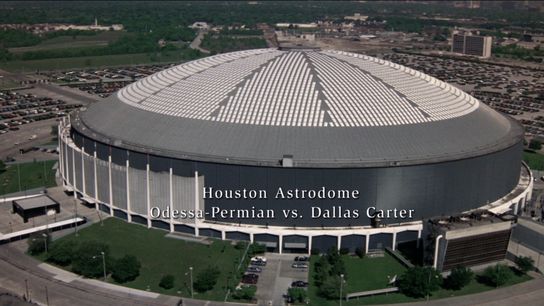
Why is there a dash between Odessa and Permian? They got Dallas Carter right, so why did they whiff on Odessa Permian? Where did it come from? Who put it there, and how can I hold them accountable?
I won't beat you down with further screenshots, but trust me when I say they messed this up every time and I'll never get over it.
-- Most of Permian's opponents stayed true to life, but this is Austin Westlake in the movie:
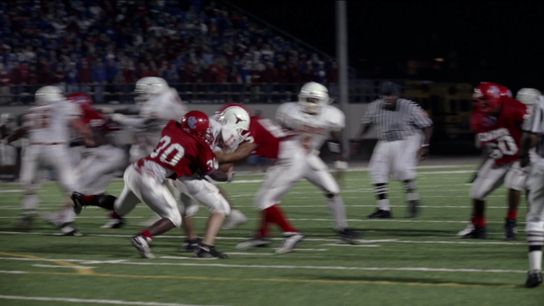
And this is Austin Westlake in real life:
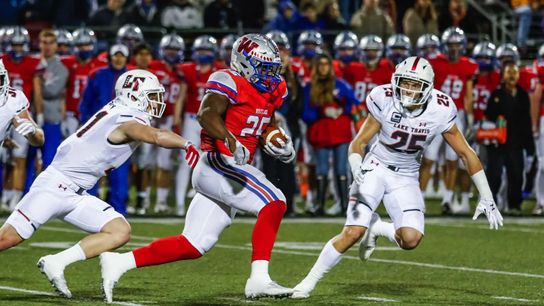
-- I need an entire oral history on how this bracket came to be.
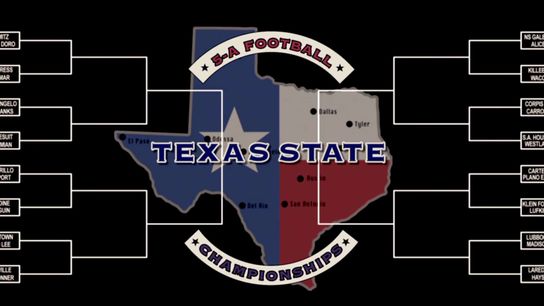
O'Connor, down in the bottom left corner, is misspelled. (The school is named after former Supreme Court Justice Sandra Day O'Connor.) Galena Park North Shore, top right, is referred to as "North Shore Galena." Dallas Jesuit, Permian's first-round opponent and a real-life non-district foe of the 1988 Panthers, did not join the University Interscholastic League until 2004. Southlake Carroll competed in Class 3A in 1988, yet they're in the 5A (no dash here, either) playoffs.
I know it seems like I'm picking nits here, but I promise the film gets most of this stuff right, which just makes the things it misses all the more confounding.
-- It shouldn't come as a surprise that the movie monkeyed with Permian's schedule, turning a 13-12 loss to Marshall into the aforementioned 42-7 win and a 49-0 win over Abilene into a 49-6 loss. It is Hollywood, after all. This is all done with the goal of making the loss to Midland Lee seem all the more devastating, but the source material was pretty dramatic all on its own: the Panthers lost to Lee 22-21, and the truck stop coin flip -- broadcast on live TV at 2 a.m. -- really did happen. Which just makes it all the more confusing why the script changed things in the first place.
-- Something else the script changed: the weather. I don't have the exact meteorological data for Sept. 9, 1988, but rest assured it was somewhere between 92 and 150 degrees at kickoff. Not in the movie's universe.
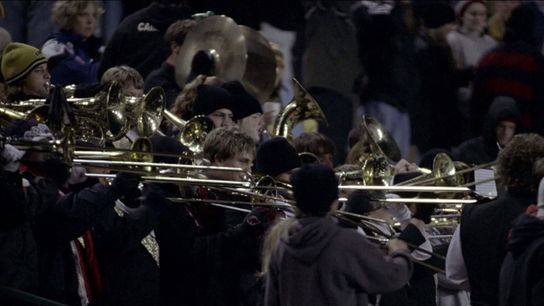
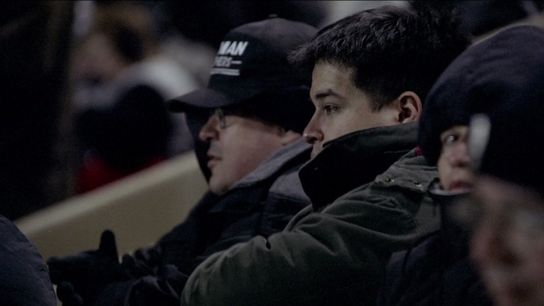
-- The loss to Dallas Carter happened in the state semifinals, not the title game.
-- Speaking of Carter, the radio announcer referred to Permian vs. Carter as "East Texas versus West Texas." Thus marked the first and last time Dallas has ever been referred to as "East Texas."
Other notes that might interest me and me alone.
-- The early part of the movie spends a lot of time building up the idea that Permian lacked size... and this was not Hollywood fluff. This MojoLand archived roster lists all of two players above 200 pounds.
-- The actor Brad Leland made a career out of playing this character, reimagined in the Friday Night Lights TV series as Buddy Garrity.
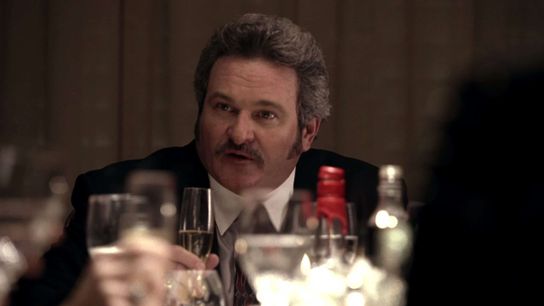
-- Also returning in the TV series with a lot more to do this time around is Connie Britton, whom you may know as Tami Taylor.
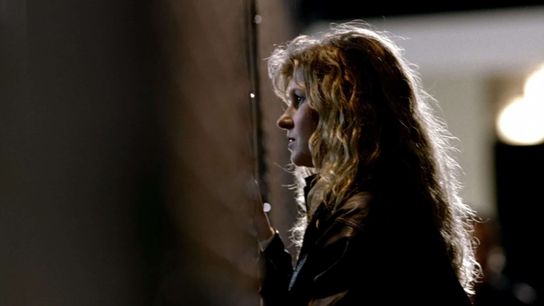
-- One scene from the book that would've been great in the movie: In real life, Permian played at Marshall, a 500-mile trip from the middle of West Texas all the way to the Louisiana border. The team flew while the rest of the town drove, meaning the Panthers essentially had the run of the town for a few hours while their parents made the 8-hour haul back.
-- Derek Luke, the actor that plays Boobie Miles, was 30 when this movie hit theaters.
-- Lee Jackson, the actor that played Ivory Christian, played safety at Texas from 1998-02.
What's the moral of the story? High school football can be a great way to build character and make life-long memories, but there is a lot more to life than what you accomplish as a 17-year-old football player.
Should you show this to your players? Absolutely. Once a season at minimum.
